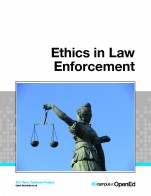
The NCJRS: National Criminal Justice Reference Service Abstracts Database is published by the U.S. Department of Justice's and can be used for research, policy, and practice related to criminal and juvenile justice. Contains summaries of over 210,000 U.S. and international publications. Updated monthly.
 Ethics in Law Enforcement
by
Steve McCartney and Rick Parent
Ethics in Law Enforcement
by
Steve McCartney and Rick Parent
To get some contextual background information on your topic, add:
AND (encyclopedia OR handbook)
to your basic search in Discover, then limit to books. This will give you resources that will help you formulate your specific topic and get some background knowledge.
Click here for an example search.
A database of encyclopedias, almanacs, and specialized reference sources. Fully searchable across all files.
The below lists of resources will help you get started on a particular topic.
 Understanding crime in Canada : an introduction in criminology
by
Neil Boyd
Understanding crime in Canada : an introduction in criminology
by
Neil Boyd
 Martin's annual criminal code
Martin's annual criminal code
 Active bystander intervention : training and facilitation guide : training for preventing and responding to sexual violence in B.C. post-secondary institutions
by
Sexual Violence Training Development Team ; contributors, Simon Fraser University and Sexual Violence Training and Resources Working Group
Active bystander intervention : training and facilitation guide : training for preventing and responding to sexual violence in B.C. post-secondary institutions
by
Sexual Violence Training Development Team ; contributors, Simon Fraser University and Sexual Violence Training and Resources Working Group
 Consent & sexual violence : training and facilitation guide : training for preventing and responding to sexual violence in B.C. post-secondary institutions
by
Sexual Violence Training Development Team ; contributors, University of British Columbia Okanagan and Sexual Violence Training and Resources Working Group
Consent & sexual violence : training and facilitation guide : training for preventing and responding to sexual violence in B.C. post-secondary institutions
by
Sexual Violence Training Development Team ; contributors, University of British Columbia Okanagan and Sexual Violence Training and Resources Working Group
 Ethics in law enforcement
by
Steve McCartney and Rick Parent
Ethics in law enforcement
by
Steve McCartney and Rick Parent
 Introduction to criminal investigation : processes, practices and thinking
by
Rod Gehl and Darryl Plecas
Introduction to criminal investigation : processes, practices and thinking
by
Rod Gehl and Darryl Plecas
Article databases contain information about articles, and often include the full-text of the articles as well.
While searching our discovery service will find articles for you, databases allow you do more controlled and precise searching.
The NCJRS: National Criminal Justice Reference Service Abstracts Database is published by the U.S. Department of Justice's and can be used for research, policy, and practice related to criminal and juvenile justice. Contains summaries of over 210,000 U.S. and international publications. Updated monthly.
Current and retrospective bibliographic information, author abstracts, and cited references found in over 1,700 of the world's leading scholarly social sciences journals covering more than 50 disciplines. They also cover individually selected, relevant items from approximately 3,300 of the world's leading science and technology journals.
Provides abstracts of journal articles and citations to book reviews drawn from over 1,700 serials publications, and also provides abstracts of books, book chapters, dissertations, and conference papers. Updated monthly.
CANSIM is Statistics Canada's key socioeconomic database. Updated daily, CANSIM provides fast and easy access to a large range of the latest statistics available in Canada. Provides access to the Canadian Censuses, the Agricultural Censuses, Aboriginal Peoples Survey, environmental data, Elections Canada data, and the time series in CANSIM (Canadian Socio-economic Information Management System).
Scholarly collection, spans nearly every area of academic study. Updated daily.
JSTOR represents over 600 journals in the arts, humanities and social sciences. NOTE: Does not provide access to current issues of periodicals. JSTOR provides archival access to journals and access to journals varies from publisher to publisher. In most cases two to five years plus the current calendar year are excluded.
Access to 2,500 full-text journals from of scientific, technical and medical fields. NOTE: Not all titles are available in full text. Full text online access to articles is limited to the journals that the TRU library subscribes to through Science Direct.
Contains more than 2 million references to psychological literature from journal articles, books, book chapters, technical reports, and dissertations. Updated monthly.
Interlibrary Loans
If you come across a book or article that you would like to use for your assignment, but the library doesn't have it, never fear! Fill out an interlibrary loan form and we will find the resource from another library and send it to you. Find the form under Interlibrary Loans on the page "Online Forms" below.
Boolean Searching
1. Use AND to combine words when you want to find articles that have both words.
Example: tea AND coffee
2. Use OR to combine words when you want to find articles that have either of the words (not necessarily both, but one or the other).
Example: coffee OR cappuccino
3. You can combine both AND and OR to create a good advanced search strategy, either by using parentheses or multiple search bars.
Example: tea AND (coffee OR cappuccino)

Phrase Searching
Put quotation marks around phrases in the search bar to ensure that the words are searched as a phrase, not individually.
Example: "social media"
Example: "early childhood education"
Truncation
Put an asterisk ( * ) at the end of words to fill in different word endings.
Example: Canad* will find: Canadian, Canadians, Canada, Canadas
Example: achieve* will find achieves, achieve, achievement, achievements
Caution: you may end up finding words that you didn't want!
Example: Chin* will find China and Chinese, but it will also find chin, chins, and chinstrap (penguins!).